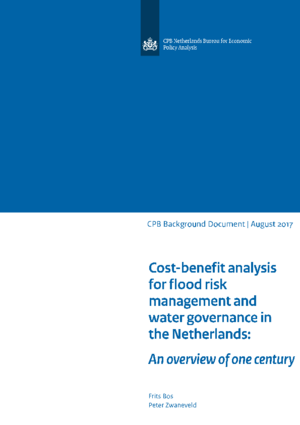August 22, 2017
Cost-benefit analysis for flood risk management and water governance in the Netherlands: an overview of one century
The Netherlands is a global reference for flood risk management. This reputation is based on a mix of world-class civil engineering projects and innovative concepts of water governance. For more than a century, cost-benefit analysis has been an important tool for both flood risk management as well as water governance in the Netherlands. It has helped to select the most effective and efficient flood risk projects and to coordinate and reconcile the interests of various policy areas, levels of government and private stakeholders.
For the first time, an overview of this well-developed practice is provided in this report. This overview includes the cost-benefit analysis in the 1901 act for enclosure of the Zuiderzee, Van Dantzig’s famous formula for the economically optimal strength of dikes and a whole set of cost-benefit analyses for ‘More room for rivers and the ‘Delta Program’ for the next century. Dutch practice illustrates how cost-benefit analysis can support and improve flood risk management and water governance; other countries may learn from this. Calculations indicate that investing in cost-benefit analysis has been highly profitable for the Dutch society.
Downloads
Authors


